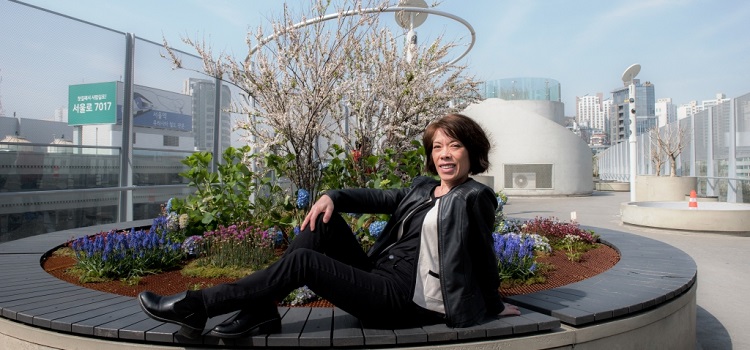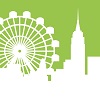
Planning to visit Seoul? We caught up with responsible travel expert, Catherine Germier-Hamel of Millennium Destinations – a consultancy helping destinations to become more sustainable.
Catherine, if you had to choose one, which would you consider your favourite place in Seoul – and what makes it so special for you?
It is actually hard for me to choose only one favourite place in Seoul, since I have been constantly uncovering old and new gems in that ever-changing and improving city.
Having said that, there is a place I will never cease to enjoy and cherish, as a nature and hike lover. This place is Namsan, which means South mountain in Korean. Considered as the geographic center of Seoul, Namsan is more a hill than a mountain, since it is only 260 meters high. I have been living at the foot of Namsan for almost 10 years, and through my kitchen window, I have the chance to admire the kaleidoscopic change of its forest on a daily basis: tender green, powder pink, ruby, golden brown, etc. according to the seasons.
Although there is a cable car to reach the N Seoul tower, a landmark of Seoul skyline, I have never taken it, and I usually prefer to hike the various trails of Namsan Park and feel the energy of the mountain under my feet. Namsan is also my favorite meditation place and photo spot.
5 tips for travelers planning to visit Seoul – Do’s and Don’ts?
- Do not try to compare Seoul with any other Asian cities, and especially Chinese and Japanese cities.
- Try Templestay or Forest Therapy, among many spiritual development experiences.
- Hike the many trails available throughout the city, and particularly Seoul City Wall, Bukhansan, on your own or with local hiking groups in Facebook such as Millennium Hikers.
- Bring your tumbler and refuse single-use plastic as much as possible, especially in coffee shops and bakeries (you will find tons of them in Seoul), although some of them have started to ban plastic straws and charge plastic bags.
- Be aware that there are not many bins in the streets, so do not expect to get rid of your waste easily. In any case, don’t throw it in the street, which seems to be obvious for the eco-traveler that you are.
As a frequent traveler, what makes a city worth visiting for you?
It might come as a surprise, but any city offering numerous green spaces, parks, nature-based experiences, has my favor.
Cities where I can be independent and live like a local are best for me.
I also prefer cities where local communities seem to be happy to receive visitors and tourists, and to accommodate their needs. Residents in some popular areas such as Bukchon Hanok (traditional house) village in Northern Seoul, have expressed their growing concerns, and even hostility, about receiving too many visitors. And the Seoul Metropolitan Government has recently come up with measures to prevent or manage “overtourism” in these areas, while identifying alternative destinations to disperse the crowds.
In general, I tend to favor off-the-beaten-track spots rather than popular, overcrowded sites, so I appreciate cities where I can find those hidden gems, and which make it easy for me to spot them.
3 ingredients for the perfect Seoul trip?
A solid stomach and an adventurous mind are recommended so that you can be prepared to explore the diversity of the Seoul food (and drink) scene.
Good hiking shoes and some training are necessary to be able to walk and hike the city without cursing or whining.
Seoul is a city where people pay a lot of attention to appearance, so it is better to look neat and groomed. In particular, check holes in your socks because you will have to remove your shoes in many places.
Which green hotels or activities would you recommend to environmentally conscious travelers visiting Seoul?
I would recommend biking in Seoul, as there are many bike rental facilities and more and more lanes for bicycles.
Seoul has developed many eco-friendly places over the past year, such as Cheonggyecheon, Seoullo7017, or other places that have been built or renovated under the Seoul20 initiative, and they are actually not crazily popular and therefore still pleasant to visit.
Many small hotels appear to be more eco-friendly than big chains, which may have sustainability programs but are more focused on social issues rather than environmental ones.
Any advice for travelers visiting Seoul on a tight budget?
There are many options for visitors on a tight budget in Seoul, such as eating local food in small restaurants, markets, convenience stores, tasting stations at supermarkets, etc. – and of course street food.
As for accommodation, many budget options are available: guesthouses, home stays, motels, templestays, hanok guesthouses, pensions, “minbaks”, etc. You can even spend the night in saunas for a very reasonable price. Except to sleep on the floor, where you will be able to enjoy traditional floor heating.
Many attractions and sites are free or have low entrance fees.
And if you rent a hanbok, the traditional Korean dress, you can have access to many museums for free.
In your view, how has Seoul as destination evolved in recent years, in terms of urban sustainability?
Seoul has definitely evolved as a sustainable urban destination, not only environmentally but also socially, as result of a strong political will from Seoul metropolitan government and a positive response from the residents.
As a result, many projects and initiatives have been initiated and implemented to improve the living environment of Seoul citizens, and promote Seoul as an attractive, sustainable, and smart destination.
Moreover, the city is hosting many international organizations promoting sustainability, green urban development, and environmental protection.
On the other hand, Seoul is regularly affected by high levels of fine particles in the air that are not only coming from China, but also emitted domestically.
Moreover, consumerism and the resulting production of waste are other issues of concern. So be prepared to wear a mask if you are sensitive to allergens, during very polluted days.
Check the lighting color of N-Tower: a blue lighting means that the air quality is clean.
Thank you, Catherine!
Connect with Catherine on LinkedIn or learn more about her work at Millennium Destinations here.
